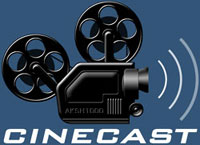What Makes Podcasts Work?
I love podcasts.
While my iPod is great for music, I'm not always a music kind of guy. In fact, I like a lot of NPR shows, but have always found myself frustrated by missing them since I don't usually have the radio on around the house. With three kids, finding time to just sit, listen and/or read is just impossible.
But podcasts fill that void perfectly, and I subscribe to many. In fact, podcasts have made walking the dog in the dead of winter a much more palatable task. Why bring this up? Because I'm fascinated by how some are being used and how many people just don't seem to fully understand the medium.
Over the next few posts I'm going to talk a bit about things that work and things that don't. Let me start with one of my favorites: Cinecast, a movie review program broadcast out of Chicago. Unlike many movie reviewers, hosts Adam Kempendaar and Sam Hallgren need to pay for their tickets. That changes things a bit. One is a father and must take time away from his family to see films, so this increases his commitment even more. In fact, the hosts readily admit that they only review movies that they are interested in seeing. Since they're both pretty big film buffs, this list is pretty long. Still, you're not going to find quickie reviews for Big Mamma's House II on this show.
Unlike many movie reviewers, hosts Adam Kempendaar and Sam Hallgren need to pay for their tickets. That changes things a bit. One is a father and must take time away from his family to see films, so this increases his commitment even more. In fact, the hosts readily admit that they only review movies that they are interested in seeing. Since they're both pretty big film buffs, this list is pretty long. Still, you're not going to find quickie reviews for Big Mamma's House II on this show.
I don't get out to films as much as I like, but I love hearing their reviews. They're intelligent and give a great synopisis of the film. It's like being back in college and discussing film as art, not just as eyecandy.
But here's the best part: they're sponsored by Peerflix. It's not that they went out looking for sponsors, though they often joked about wanting one on the show, but doing the show takes up enough time, getting out to sell it would take even more. No, the sponsor came from a listener who thought that the two lined up perfectly and connected them. Talk about a loyal audience!
So, what works here? First is the hosts. They are wonderfully smooth, understand their subject matter (Adam has a degree in film), have a passion for their subject, and have used the podcast and the show blog to create a strong community of listeners (1662 according to Frappr). They regularly read feedback representative of the audience, offer up polls on the show blog and take listener suggestions seriously. One listener suggestion about creating a top five list of "man crushes" brought in weeks of emails and voicemails on the topic.
Also, the show notes that appear on my iPod give me timecodes for everything, so if I just want to hear listener feedback, that's all I have to hear. They also have a solid schedule that they follow to the letter, keep shows from getting too long and don't go off too far on tangents. I don't know their political views and frankly, I don't care. I'm here for movie talk and that's what they give.
Would this work as a radio show? Perhaps, but then they'd have to worry about ratings. Because this is a labor of love and not tied down to any concrete geographic area, the right listeners can find them from anywhere in the world. If Adam and Sam found themselves on NPR and saw blips in the ratings each time they talked about a particular type of movie, they'd start to gravitate in a particular direction.
For now, this is perfect the way it is. And my dog is just grateful to Adam and Sam that I'm giving him a little more time on his walk.




